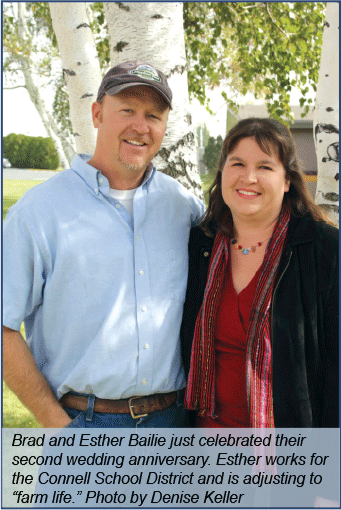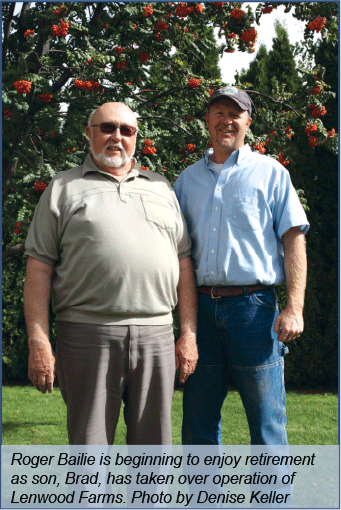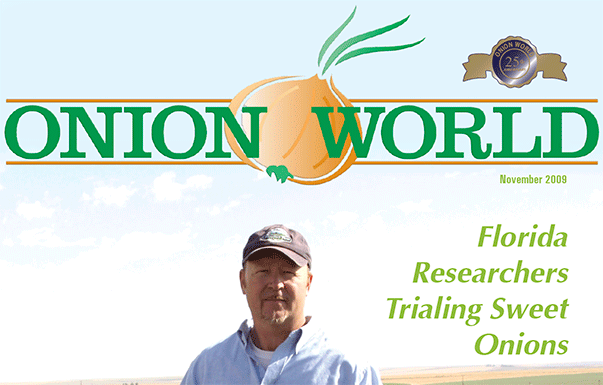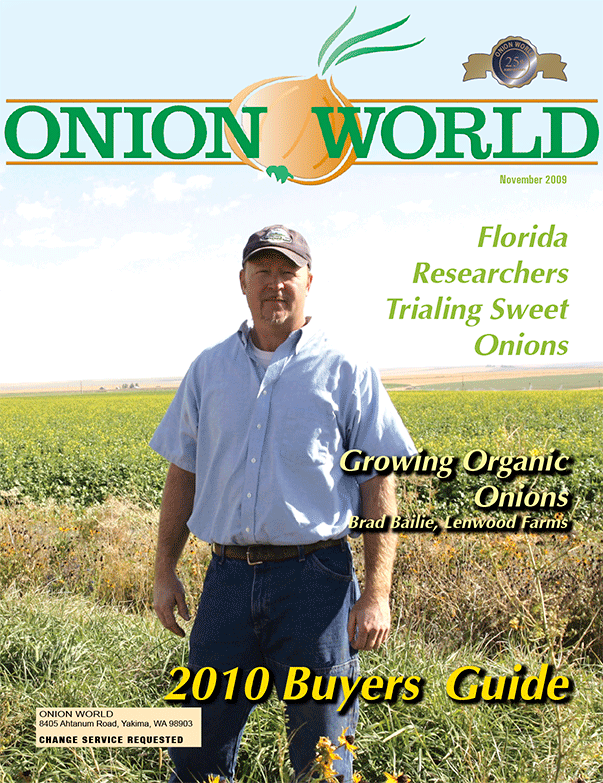In November 2009, organic onion grower Brad Bailie of Lenwood Farms was on the cover of Onion World. Bailie was proving that an organic farmer could witness solid yields and consistent quality but also talked about the challenges of staying organic.
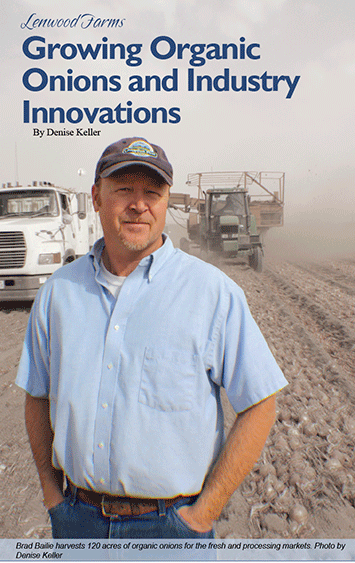
Lenwood Farms
Growing Organic Onions and Industry Innovations
Story and Photos By Denise Keller
While the Bailie family has been farming some of the same land in Connell, Wash., for nearly 100 years, fourth-generation farmer Brad Bailie continues to refine and improve the agricultural practices used on his organic onion operation, experimenting with methods that can potentially benefit conventional farms, as well.
Brad grows 120 acres of red and yellow onions for the fresh and processing markets, in addition to potatoes; heritage grains (including emmer, spelt and black barley); camelina; winter squash; and peas. All the crops are farmed under organic production.
Farming in the Dry Land
The land now under Brad’s management is located just outside the eastern edge of the Columbia Basin Irrigation Project. The ground was first farmed in 1901 and has been in his family’s name since around 1915. The family produced dry land wheat before eventually putting the and into the Conservation Reserve Program (CRP), a government-sponsored soil conservation measure. The program pays farmers to plant vegetative cover such as native grasses and then leave the ground idle.
Meanwhile, Brad’s father, Roger, bought some acreage of irrigated ground nearby on which he ran a conventional, diversified row crop farm. Brad’s sister and brother-in-law now farm there.
After earning a degree in Crop Science from Washington State University in 1995, Brad put in some time working for a seed company, farming with his dad on rented land, and doing agriculture development work in Guatemala. During this time, the Bailies withdrew a couple hundred acres from the CRP and leased the land to another grower for organic vegetable farming.
In 2003, Brad returned to the family farm and decided to keep it under organic production. Using water drawn from a well Roger drilled for a small-scale irrigation project in the early 1970’s and a second well drilled a couple years ago, Brad now farms five circles in the middle of CRP land.
“I think it’s a benefit to us that we are surrounded by our own land that’s not being farmed conventionally and sprayed with herbicides and insecticides. That also makes it possible for us to have a buffer around the farm,” Brad explains.
Yield and Quality
Now in his fifth season of organic onion production, Brad is proving that an organic farmer can witness solid yields and consistent quality. This year’s crop was no exception.
“Because it’s organic doesn’t means the onions are necessarily going to be low yielding and of inferior quality,” Brad states. “On the contrary, I think it could be better quality and better yielding because the health of the farm is better. The soil is better, the environment around the farm is potentially better, if you do it right.”
Yields significantly increased in the last three years, Brad says, after switching to drip irrigation. Previously, he had been growing onions under sprinkler irrigation and was having little success. Well water in the area is high in minerals such as sodium, which were causing soil filtration problems. As a result, Brad was experiencing run-off with overhead irrigation. Discouraged, he took a break from growing onions.
A couple of years later he was approached by Brian Andersen, the owner of a drip irrigation business. Brad decided to increase his onion acreage and form a partnership with Andersen, although the organic grower is ambivalent about drip irrigation because of the “heavy footprint” the production and distribution of the one-time-use plastic has on the environment.
“Some people might think that’s not necessarily a sustainable thing to be using drip tape. I don’t know,” Brad admits, adding that he does recycle all of the drip tape pulled out of the field. “I just know when they talk about sustainability, they talk in terms of economic sustainability, environmental and social. A farmer has to be economically sustainable or he’s not going to do it anymore.”
Also in the last three years, Brad has refrained from spraying insecticides for onion thrips. In-stead, he monitors the pest populations and takes a “wait and see approach.” What he has been seeing is the thrips populations reach a certain point, then decrease without damaging the crop.
“I think one of the things we have going for us is because we’re not using chemicals early on in the onion crop, such as herbicides that set the onions back, and we’re doing mostly hand labor on the weeding, those onions just keep growing,” the grower points out. “If we’re more advanced in our growth when the thrips are coming in, maybe they’re not able to do as much damage because the plants are healthier.”
Commitment to Conservation
Brad, who serves on the Franklin County Conservation District board of supervisors, has an appreciation for nature and wants to preserve the land he farms. And, like all farmers, he wants to make a good living in the process. Through organic farming and conservation methods, he is able to accomplish both, he says.
“I believe organic and conservation just go hand in hand. That’s why a lot of the projects that I want to implement on my farm make sense more than financially. It’s the health of the entire environment I’m farming in,” Brad says.
His projects on the farm include the creation of habitats for beneficial insects through the use of insectaries and beetle banks. Brad uses diverse species of flowering plants to attract and keep beneficial insects that will hopefully mi-grate into the fields looking for prey. Insectaries are located in corner areas that would otherwise be unused, as well as around the outside border of fields and along pivot roads.
Brad is experimenting with the use of beetle banks — raised mounds of natural grasses — to attract weed seed-eating beetles. Currently, he is trying to determine how many beetle banks would be needed throughout the farm in order to be effective.
“I’m realizing how complex the relationships are between every organism that lives on the farm, including me,” the grower reports. “There’s this interaction going on all the time. I’m just trying to find ways that make that interaction peaceful.”
Other conservation methods Brad practices include the use of various manures, cover crops, irrigation water management and a five- or six-year rotation.
“I think I had all this inside me, but before I was an organic farmer I didn’t really have a place to express it,” Brad shares. “Now that I’m organic farming, I can make this all happen. It makes me feel a lot more content in what I’m doing and feeling like I’m actually making a difference.”
Organic Production Challenges
Making the move from conventional farming to organic onion production required Brad to drastically change his way of thinking. As an organic farmer, it is vital for him to consider the long-term consequences of his actions and to be creative.
“I think what’s challenging about organic is you don’t have any silver bullets in your tool belt, really,” the grower expresses.
When facing an insect or disease problem, instead of searching for an organic approved chemical to use in place of a synthetic product, Brad strives to think of alternatives that will make the use of chemicals unnecessary.
“Growing organically, I have to use methods that aren’t as intensive. I can’t just go out and say, ‘I need 200 pounds of nitrogen’,” Brad elaborates. “So what I’ve tried to do is grow as much of my nitrogen as I can through legumes.”
Brad uses legumes including hairy vetch and chickling vetch as cover crops. Leguminous cover crops form symbiotic relation-ships with rhizobia, a soil bacteria that fixes nitrogen after becoming established inside root nodules of legumes, leaving residual nitrogen in the soil.
“The goal of a farmer, especially an organic farmer, is to try to create the ideal circumstances for the microbiology in the soil so that they can provide the nutrients you need for your crop,” the grower explains.
Brad also grows organic mustard as a biofumigant crop.
Looking Forward
Brad predicts that organic farming will become increasingly popular in the future, but expects to see a more noticeable increase in the number of growers beginning to implement organic agricultural practices on their conventional farms.
“The key word is going to be sustainable. As long as it’s sustainable, I don’t know if it necessarily has to be organic. I think that’s one way to accomplish it, but a good conventional farmer that’s conservation minded will do a really good job of growing healthy food,” Brad says. “Even though they may not be getting the organic premium on the products they’re producing, they may be able to implement some of the beneficial practices and actually save themselves money in what they’re doing.”
SEE THE ORIGINAL MAGAZINE HERE
